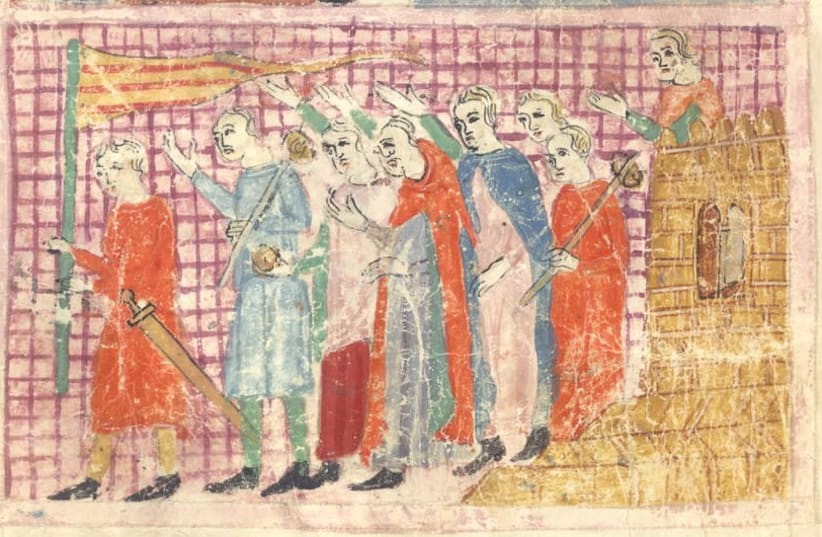This week’s Torah portion tells us about Balak ben Zipor, a Moabite king who was afraid of the Jewish nation camping adjacent to his land. He knew his chances of beating the Israelites in battle were slim, so he looked for unconventional solutions. He sent people far to the East to bring Bilaam ben Be’or, who was known as a man whose blessings and curses came true, from Aram Naharayim .
Bilaam asks God if he should go with Balak’s men and God forbids it. Balak then sends a second, larger, more important delegation that promises him whatever he wishes. Bilaam again asks God for permission and this time God permits him to go with Balak’s representatives, as long as he does what God wants.
Bilaam saddles his donkey and goes with the Moabite king’s men. God is angered by this and sends an angel to delay Bilaam three times. Bilaam doesn’t see the angel, but his donkey does and tries to escape. On the third attempt, Bilaam gets angry at the donkey and hits it over and over again. And then the donkey opens its mouth and speaks to Bilaam! The donkey protests being hit, while Bilaam claims it is the donkey who is abusing him.
Then God opens his eyes and he sees the angel. The angel tells him that he should continue on to Balak but only say what God wants him to say. Bilaam tries to curse the Jewish people three times from three different places, but all that comes out of his mouth are blessings.
By examining this event, we reveal Bilaam’s character, as well as the message hidden in this story. Indeed, Bilaam was a prophet and had great spiritual powers, but he was not connected to God’s will.
This trait of Bilaam’s comes up again and again. When Balak’s people approached him, he knew that Hashem was the God of Israel and that He would not want them cursed, yet he still waited to ask God if he should go. The same happened with the second delegation. When God saw that Bilaam really desired to go to Moab, He permitted him to go on condition that he only speak the words of God. But Bilaam went in the hopes that God’s will would change and that he would ultimately be able to curse Israel.
This is also the message given by the donkey: It has been years that you have been riding me day after day. I have been loyal to you. But as soon as something happens that isn’t to your liking, you hit me? Have you asked yourself why I’m behaving this way? Have you tried to understand me?
In his prophecies about Israel, Bilaam says of himself, “one who hears God’s sayings and perceives the thoughts of the Most High” (Numbers 24:16).
The Talmud says of this, “Now clearly, Bilaam did not know the mind of his animal, so he would know the mind of the Most High? Rather, this teaches that he was able to determine the hour that the Holy One, Blessed be He, is angry” (Tractate Brachot 7:1).
The sages point out the gap expressed in the words of the donkey. Bilaam was incapable of understanding the rebuke of the animal he was riding. Could such a person understand God? They respond that Bilaam knew how to determine the one moment in the day when God was angry, and at that moment, he tried to curse Israel. Bilaam was not connected to God in his prophecy, but rather tried to harness God’s power to his needs.
We can learn from this something about a suitable character and about our connection with God. We must aim for a connection that strives to understand God’s will, and understand where we can fit in with this will, rather than a connection that strives to harness the Creator to our needs. We can extrapolate from this to an understanding of marriage or any relationship with others. We shouldn’t see others only from our own perspective or try to take advantage of the relationship for our own needs. We must strive to understand others, to try to understand the motivations behind uncharacteristic behaviors, and sincerely connect with them.
The writer is rabbi of the Western Wall and Holy Sites.
